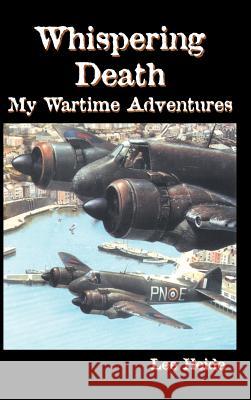Whispering Death » książka
Whispering Death
ISBN-13: 9781412201292 / Angielski / Twarda / 2000 / 252 str.
Whispering Death
ISBN-13: 9781412201292 / Angielski / Twarda / 2000 / 252 str.
(netto: 106,79 VAT: 5%)
Najniższa cena z 30 dni: 110,59
ok. 16-18 dni roboczych.
Darmowa dostawa!
Lee Heide's wartime adventures read like fiction but they are factual, brought to life by skillful characterization and dialogue. Raised in Vancouver, he was trained as a navigator and flew overseas in a Hudson aircraft in June, 1941. In England he joined an RAF crew for training on Beaufort torpedo bombers. Sent to Malta, he survived a year of the blitz on that island, with heavy losses to his squadron. Upon converting to Beaufighters he was twice posted as missing. The first time, he and his pilot were washed ashore, after five days in a dinghy, on enemy-held Elba whence they escaped by boat to Corsica. The second time his aircraft was shot up in the Aegean and forced to land in Turkey where he was interned. A meticulous recorder, Heide's descriptions of places and events in the Middle East are informative and entertaining. The title Whispering Death was the name given by the Germans to the Beaufighter--one of the outstanding attack aircraft of the war. Readers will not lightly put down this autobiography
Review
from Canadian Military History Book Review Supplement, Autumn 2000
This is another small-press memoir that brings us a dimension of war that is not widely known. The author, a Vancouver native, flew overseas in a Hudson bomber in 1941 and then, after further training in England, was posted to the Middle East, where he flew as a navigator on Beaufort and Beaufighter torpedo bombers over the Mediterranean (the title refers to the nickname given to the Beaufighter). He spent a year operating from Malta and, after conversion to Beaufighters, survived two forced landings. The first, in the sea, resulted in a five-day ordeal before he and his pilot washed ashore onthe island of Elba, from which they escaped to Corsica. This was followed by instructional duties on Cyprus, which lasted only until a pilot friend convinced him that it was better to be killed on operations than be killed by a student pilot. Heide and his pilot were posted to an operational squadron on Tobruk, and then went through a second ditching. On this occasion, they managed to reach land, but it was neutral Turkey and they were interned (albeit in quite pleasant conditions) for a short period of time before returning to the squadron. The war in the desert wound up in late 1944, and Heide was back in Canada, newly demobilized and with a DFC and a British wife, by the spring of 1945. A keen observer, Heide spins a good tale; Whispering Death is an informative and entertaining book with lots of good anecdotes and local colour.











